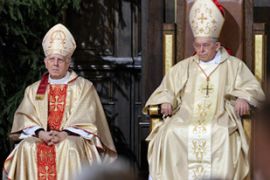Polish church crisis a blow to pope
Warsaw’s archbishop’s resignation plunges the Polish church into a period of uncertainty.

Published On 8 Jan 2007
While the scandal plunges the Polish church into a period of uncertainty, it will have a knock-on effect on the Pope who appointed Wielgus on December 6 and stood by him to the last minute.
As Polish media produced mounting evidence of the cleric’s relations with the communist government, the Vatican said the pope had chosen him “in full knowledge of the facts” of his past.
Apology
Clifford Longley, a religious commentator, said: “It’s very unfortunate for Benedict, it looks like he owes the Polish church an apology because it happened on his watch.
“It’s done the Polish church considerable harm.”
Soon after his appointment, Polish media reported that Wielgus had informed on fellow clerics for about 20 years from the late 1960s.
Colleagues rallied around to deny the reports, often noting that he enjoyed the pope’s personal backing.
“Either the pope was reckless in the appointment because he hadn’t fully established the information about the person, or he was morally questionable in that he went ahead with the appointment in full knowledge of the background,” Luxmoore said.
“The pope could be damaged by this, I can’t see it any other way.”
‘Strange alliance’
The Vatican accused the Polish church’s opponents of being vindictive in dragging up Wielgus’s past.
Federico Lombardi, a Vatican spokesman, blamed a “strange alliance between the persecutors of the past and their adversaries” for a “wave of attacks”.
But Luxmoore said such a response was inadequate, and compared the incident with the sex-abuse scandals that hit the Catholic church in the United States and elsewhere.
“In a way it is comparable to the sex-abuse crisis and the response will need to be the same as the Western church’s response to sex abuse. They didn’t try to deny it and bury it, they did come clean about it and confront it.”
Communist oppression
The scandal could also taint the Catholic church’s image as a bulwark against communist oppression, an image personified by Benedict’s predecessor, Pope John Paul II, a Pole who campaigned against Soviet-era rule.
“We have been accustomed to seeing the church as this seamless robe of heroism and sanctity which could never be faulted anywhere,” Luxmoore said.
“It has to be seen much more as an institution which played a critically important role in the defence of human rights, in defence of moral values under communist rule, but nevertheless was not perfect by any means.”
Source: News Agencies